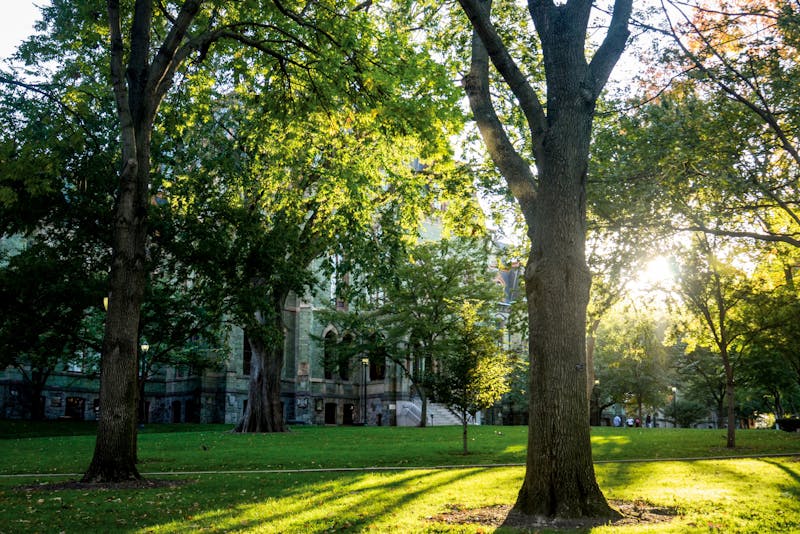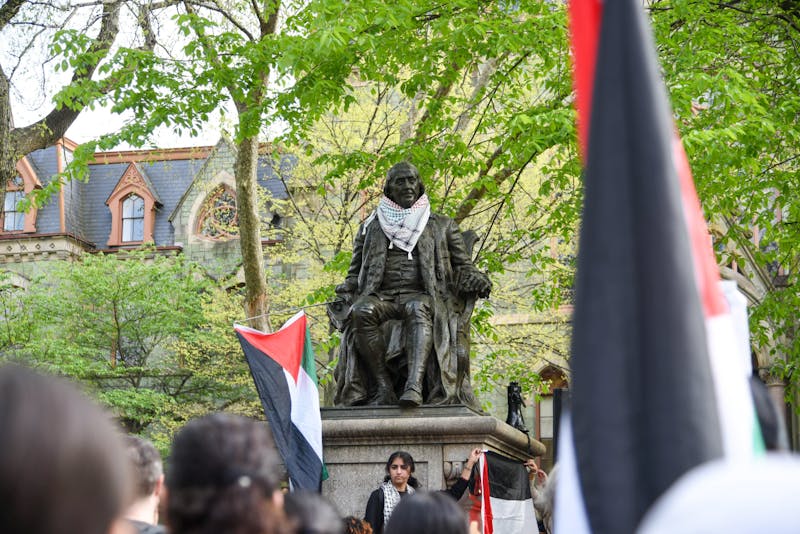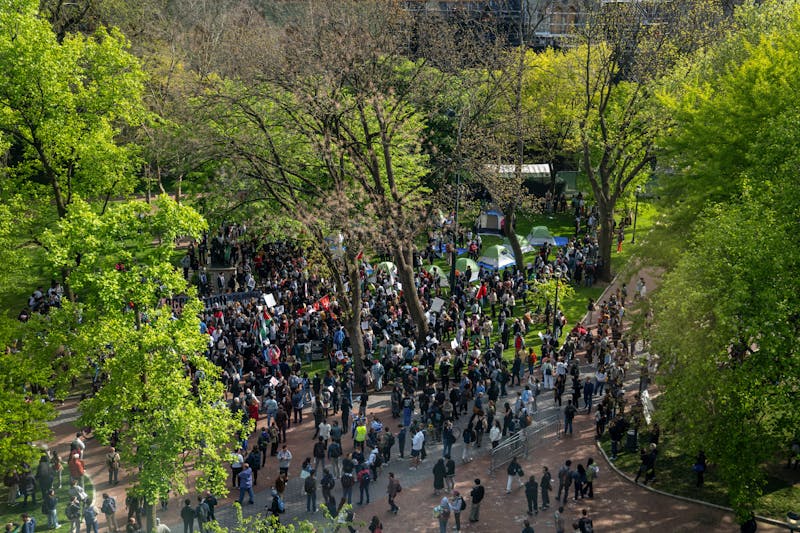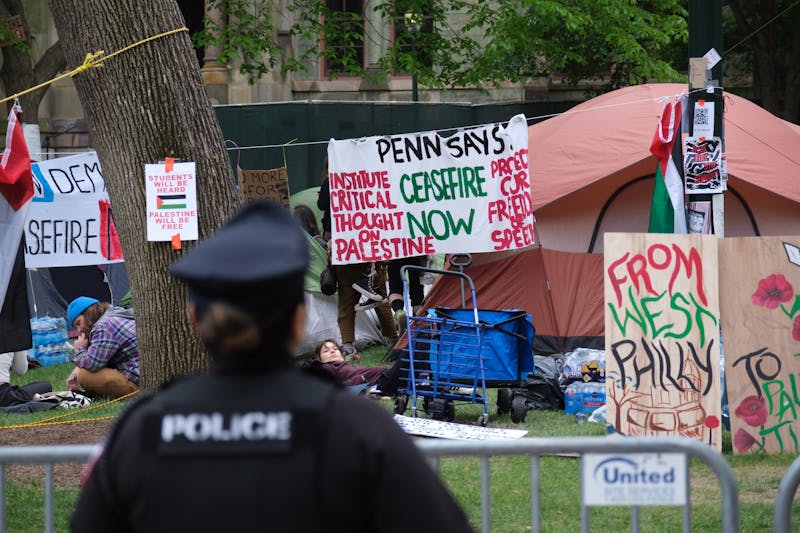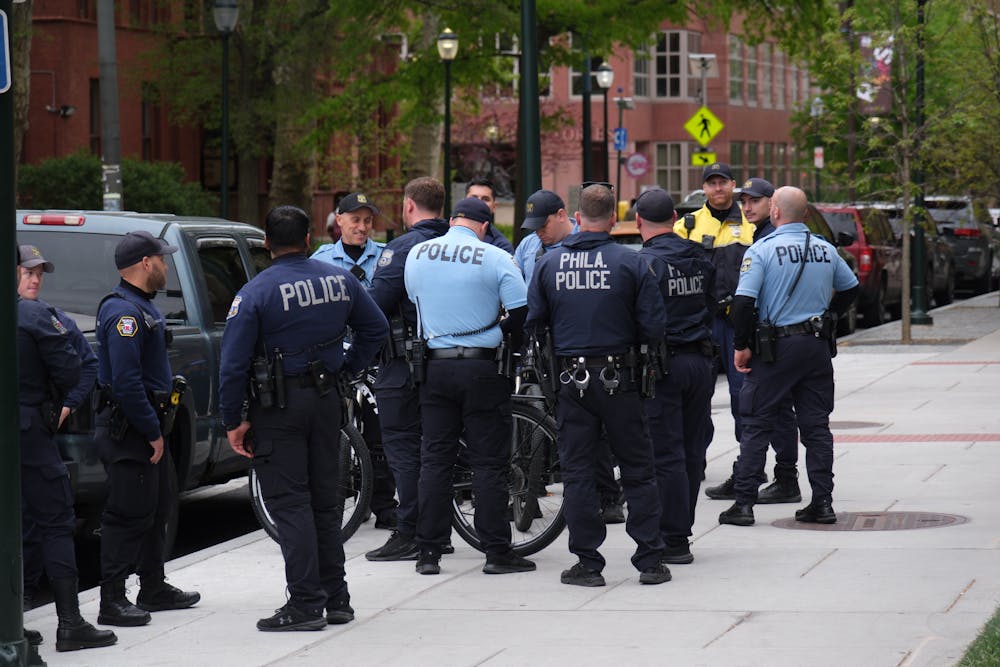
As protesters head into the fourth day of the ‘Gaza Solidarity Encampment,' organizers have indicated that they will remain on College Green despite a Friday warning from Interim Penn President Larry Jameson to disband immediately.
In an April 26 email to the Penn community, Jameson outlined several violations of University policies made by the encampment. Violations include reported and documented “harassing and intimidating comments and actions by some of the protesters.” He wrote that this alleged harassment violates Penn’s open expression guidelines and state and federal law, including Title VI of the Civil Rights Act.
As the encampment and programming continues, here is how the University has responded to previous instances of student activism on campus.
Freedom School for Palestine
In November 2023, a group of pro-Palestinian student activists from the Freedom School for Palestine group held a multiweek sit-in in Houston Hall. The demonstration — which included speakers, grief and memorial services, and film screenings — demanded a ceasefire in Gaza, protection of free speech on campus, and freedom to discuss Palestinian issues.
On Nov. 15, 2023, University representatives initially warned students that they must vacate Houston Hall or risk being arrested. Students were then told that they could show their PennCards to remain in the building or leave. Five demonstrators chose to show their PennCards on the first night.
In the second iteration of the demonstration, five students faced disciplinary action from the University following their involvement in a Feb. 19 study-in at Van Pelt-Dietrich Library. The students were informed that their participation violated the University's Code of Student Conduct and Guidelines on Open Expression.
Fossil Free Penn
In September 2022, the student group Fossil Free Penn began an encampment on College Green. Its demands included the preservation of the University City Townhomes affordable housing units, total divestment from fossil fuels, and payments in lieu of taxes, or PILOTs, to Philadelphia public schools. Penn officials acknowledged the concerns raised by FFP at the time, but requested the group end the encampment to enable “genuine dialogue.”
The protests escalated during Penn's Homecoming game on Oct. 22, 2022, when approximately 75 students entered the field with banners and flyers, aiming to delay the game and draw attention to the encampment's demands. The demonstration resulted in over a dozen students being arrested. The students received citations for defiant trespass and were released from Penn Police headquarters after several hours.
The day after the Homecoming demonstration — 39 days after the encampment began — FFP voluntarily ended its encampment.
UC Townhomes
The Save the UC Townhomes Coalition held an encampment in West Philadelphia in July 2022 to protest the sale of 70 affordable housing units. Programming from the coalition included organized marches, teach-ins, and block parties to raise awareness and resist the sale.
On the morning of Aug. 17, 2022, the Philadelphia Sheriff’s Office enforced a court ruling to vacate the encampment. As law enforcement attempted to remove tents and barricades, protestors physically defended the encampment. One individual was cited for disorderly conduct, though no arrests were reported.
While Penn students were involved in the organization and execution of this demonstration, University administration played no role in the decisions involving law enforcement that ultimately ended the encampment.
Occupy Philadelphia
In October 2011, Occupy Philadelphia established an encampment outside of City Hall with over 350 tents. The tents remained in Dilworth Plaza for nearly two months.
Following a three-day grace period set by former Mayor and 1979 Wharton graduate Michael Nutter, Philadelphia police executed a raid on Dilworth Plaza. The raid resulted in the arrest of 52 individuals associated with the movement, including four Penn students and one faculty member. The decision was made by City officials, with no involvement from Penn administration.
Occupy Philadelphia organizers and students held events on Penn's campus, including a sit-in at Van Pelt Library and rally at Huntsman Hall. The events did not result in arrests or action from law enforcement.
Penn for Peace
In November of 2001, around 30 members of the student group “Penn for Peace” established an encampment on College Green. The demonstration sought to raise awareness about the consequences of governmental policies in the wake of Sept, 11, 2001. The group’s agenda focused on opposing the United States bombing campaign in Afghanistan and laid off workers affected by the economic downturn.
In October 2002, members of the student groups Penn for Peace and Empty the Shelters erected tents on College Green again to protest former Vice President Dick Cheney's visit to campus. The protesters opposed Cheney's role in advocating for the Iraq War and the broader foreign policies of the Bush administration. The encampment featured a 10-foot tall Cheney puppet.
Protesters expressed disappointment that Cheney opted to keep his visit private with no direct engagement with students. This decision was criticized as being indicative of a "closed-door" approach from the administration.
Current policies
Penn's guidelines on open expression — which were created in 1968 amid Vietnam War protests — aim to protect free speech within University operations. The guidelines also established the Committee on Open Expression as an independent advisory body that investigates conflicts around open expression and interprets the guidelines.
Enforcement of these guidelines falls under the vice provost for university life's office and designated open expression observers. These observers, who wear red lanyards and volunteer in addition to their staff roles, are tasked with enforcing open expression guidelines during events and protests.
The guidelines specify that expression can only be restricted when it interferes with University functions, not based on the content of the expression. Student protesters have expressed frustration over a lack of transparency regarding University disciplinary processes, referencing inconsistencies between administrative behavior and open expression guidelines.
The Daily Pennsylvanian is an independent, student-run newspaper. Please consider making a donation to support the coverage that shapes the University. Your generosity ensures a future of strong journalism at Penn.
Donate







